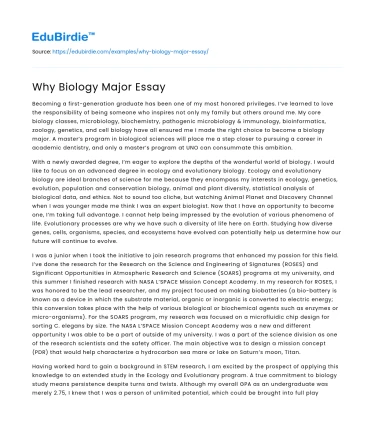Becoming a first-generation graduate has been one of my most honored privileges. I’ve learned to love the responsibility of being someone who inspires not only my family but others around me. My core biology classes, microbiology, biochemistry, pathogenic microbiology & immunology, bioinformatics, zoology, genetics, and cell biology have all ensured me I made the right choice to become a biology major. A master’s program in biological sciences will place me a step closer to pursuing a career in academic dentistry, and only a master’s program at UNO can consummate this ambition.
With a newly awarded degree, I’m eager to explore the depths of the wonderful world of biology. I would like to focus on an advanced degree in ecology and evolutionary biology. Ecology and evolutionary biology are ideal branches of science for me because they encompass my interests in ecology, genetics, evolution, population and conservation biology, animal and plant diversity, statistical analysis of biological data, and ethics. Not to sound too cliche, but watching Animal Planet and Discovery Channel when I was younger made me think I was an expert biologist. Now that I have an opportunity to become one, I’m taking full advantage. I cannot help being impressed by the evolution of various phenomena of life. Evolutionary processes are why we have such a diversity of life here on Earth. Studying how diverse genes, cells, organisms, species, and ecosystems have evolved can potentially help us determine how our future will continue to evolve.
I was a junior when I took the initiative to join research programs that enhanced my passion for this field. I’ve done the research for the Research on the Science and Engineering of Signatures (ROSES) and Significant Opportunities in Atmospheric Research and Science (SOARS) programs at my university, and this summer I finished research with NASA L’SPACE Mission Concept Academy. In my research for ROSES, I was honored to be the lead researcher, and my project focused on making biobatteries (a bio-battery is known as a device in which the substrate material, organic or inorganic is converted to electric energy; this conversion takes place with the help of various biological or biochemical agents such as enzymes or micro-organisms). For the SOARS program, my research was focused on a microfluidic chip design for sorting C. elegans by size. The NASA L’SPACE Mission Concept Academy was a new and different opportunity I was able to be a part of outside of my university. I was a part of the science division as one of the research scientists and the safety officer. The main objective was to design a mission concept (PDR) that would help characterize a hydrocarbon sea mare or lake on Saturn’s moon, Titan.
Having worked hard to gain a background in STEM research, I am excited by the prospect of applying this knowledge to an extended study in the Ecology and Evolutionary program. A true commitment to biology study means persistence despite turns and twists. Although my overall GPA as an undergraduate was merely 2.75, I knew that I was a person of unlimited potential, which could be brought into full play through extra persistence. My undergraduate experiences have inspired me to continue my education in graduate school so I can further my research and make meaningful contributions to our community. Well-grounded in academics, research, and experimental skills, I am ready to travel a long way in my lifelong research career by attending this highly regarded master’s program.






 Stuck on your essay?
Stuck on your essay?

